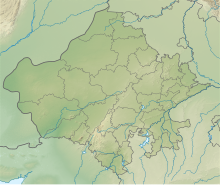| Battle of Singoli | |||||||||
|---|---|---|---|---|---|---|---|---|---|
| Part of Kingdom of Mewar - Delhi Sultanate Conflict (1326 to 1518) | |||||||||
| |||||||||
| Belligerents | |||||||||
|
|
| ||||||||
| Commanders and leaders | |||||||||
| Hammir Singh | Unknown | ||||||||
  | |||||||||
The Battle of Singoli (1336) was fought between the forces of Mewar, led by Hammir Singh, and the Delhi forces, led by a commander of Muhammad Bin Tughlaq, at Singoli, in present-day Madhya Pradesh, India.
Hammir Singh had gained control of Mewar by evicting Maldev's son Jaiza, the Chauhan vassal of the Delhi Sultanate. Jaiza fled to the Delhi court of Muhammad bin Tughluq, prompting Tughlaq himself to march towards Mewar with his strong army. In the ensuing battle, the Tughlaq army was defeated and Muhammad bin Tughlaq was taken prisoner. He was kept prisoner in Chittorgarh for three months and released after the Sultanate ceded Ajmer, Ranthambor, Nagaur and Sopor; and paid 50 lakhs rupees and 100 elephants as ransom to Hammir Singh. The above narrative is according to Rajput chronicles. According to Rima Hooja and Majumdar, the defeat and the imprisonment of the Sultan cannot be regarded as true. However, a 1438 Jain temple inscription attests that Rana Hammir Singh's forces defeated a Muslim army; this Sultanate army could have been led by some generals, and not Muhammad bin Tughlaq himself.
Aftermath
Rana Hammir Singh took control of Ajmer, Ranthambore, Nagaur, and Sopor after this victory making whole of Rajputana independent of the Sultanate and his authority was recognized by other Rajput chiefs.
References
- ^ R. C. Majumdar, ed. (1960). The History and Culture of the Indian People: The Delhi Sultanate (2nd ed.). Bharatiya Vidya Bhavan. p. 70.
The story of Hammira's success against the Muslims cannot, therefore, be regarded as altogether baseless. We may accept the conclusion of Ojha that not only Mewar but nearly the whole of Rajputana became practically independent of Delhi Sultanate, but, as he rightly observes, the story of the defeat and imprisonment of Muhammad Tughluq cannot be regarded as true in the absence of corroborative evidence. Possibly the Muslim army was led by some general and not the Sultan himself.
- ^ Rima Hooja (2006). A History of Rajasthan. Rupa & Company. pp. 331–332. ISBN 9788129108906.
This article about a battle in Indian history is a stub. You can help Misplaced Pages by expanding it. |